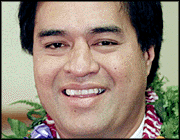Advertisement - Click to support our sponsors.


View Point
A few months ago, there was a furor over the city's disturbance of Hawaiian burial sites during a rush to complete construction projects -- a violation of state law. It was revealed that 37 ancestral remains had been disturbed during excavation for a Waikiki water project alone. Burial sites
must be protectedWhile the administration promised that it would never happen again, not enough has been done to back that vow with meaningful legislation or public scrutiny. In fact, as the Waikiki work continues, the number of unearthed remains has grown to 55.
Under state law, all earth-disturbing construction projects, including those by the city, must undergo a state historic preservation review to guard against the destruction of historical or burial sites. Work cannot begin until the state gives the go-ahead.
The objective of the state law is to ensure that remains are handled in accordance with Hawaiian cultural practices. However, the city administration has failed to comply with the specified conditions, or to submit plans for proper review, in its election-year rush to construct projects.
The city has never had a comprehensive county plan to address such matters throughout Oahu. Toward that end, I introduced a resolution in March calling for the establishment of an Oahu Historic Preservation Commission, already provided for by city ordinance 93-55, initiated by City Councilman Andy Mirikitani in 1993.
The Council at that time unanimously approved formation of the commission to review and advise the city on construction projects that impact culturally significant sites. Yet the commission has never been established because the Harris administration has deemed the Council did not have authority to create the commission, and that it would result in additional bureaucracy and expense.
The city's lack of cultural sensitivity in this case demonstrates a critical need for the advice of experts in Hawaiian culture, history, archaeology and other disciplines. The proposed all-volunteer commission would consist of nine knowledgeable members, appointed by the mayor and confirmed by the Council.
The failure of the Council to act on this measure, however, is puzzling. In September 1996, Council members unanimously rejected Bill 69, which proposed to repeal ordinance 93-55 in favor of a mayor's advisory historic preservation committee. Nonetheless, Chairman Jon Yoshimura, author of Bill 69, ordered a consecutive referral of Resolution 00-44 in a highly unusual move.
As a result, my resolution, having unanimously passed out of the Cultural Affairs Committee that I chair, has been sitting in Councilman Steve Holmes' Public Works, Environment and Parks Committee. Three opportunities to hear the bill have already been lost due to his inaction; an attempt to shake it loose fell short of the necessary five votes.
Fortunately, grassroots support and momentum for the program continue to grow through public awareness of the measure. The Respect Our Ancestors Network, led by Beadie Dawson and the Rev. Darrow Aiona among others, has been formed and is actively lobbying for the formation of the Oahu Preservation Commission.
The failure of the city administration and certain Council members to embrace this issue, not only in making it pono in deference to ancestral remains, but out of respect to native Hawaiians, is bewildering.
How can we advocate a return to a Hawaiian sense of place in Waikiki and not take better care to ensure that the iwi of our Hawaiian ancestors are protected and preserved, irrespective of who is mayor and who sits on the Council?
Mufi Hannemann resigned from the Honolulu City Council yesterday to run for mayor.